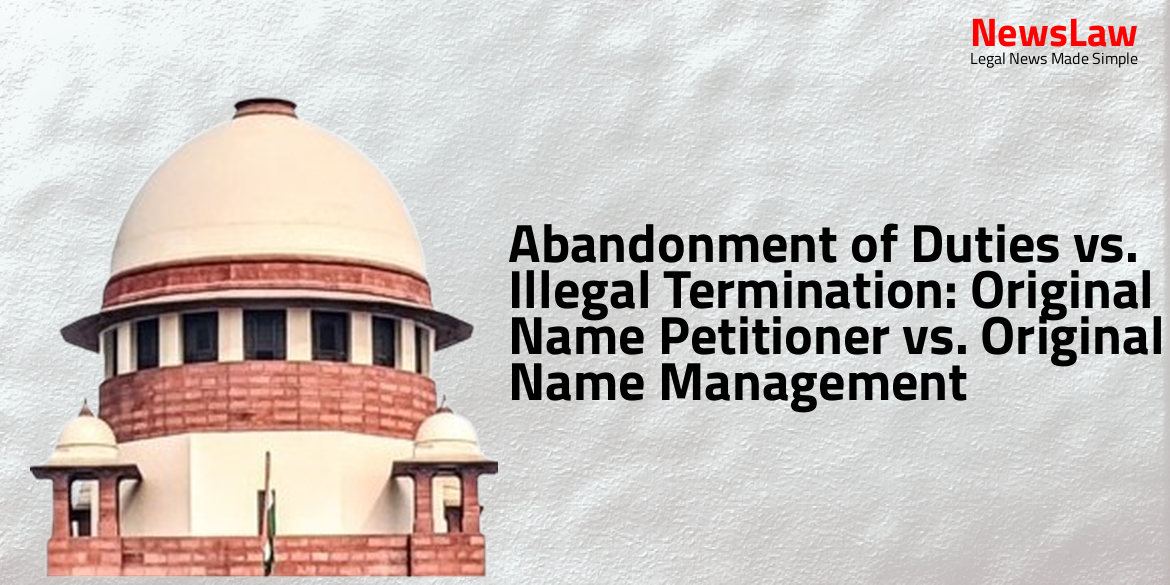Explore the detailed legal analysis undertaken by the court in a recent case concerning the calculation of compensation for loss of dependency. The court’s assessment, considering factors such as the deceased’s income, statutory provisions like minimum wages, and past judgments, exemplifies the meticulous approach to ensuring fair and equitable compensation for the claimants. Stay tuned for insights into the court’s reasoning and the impact on compensation outcomes.
Facts
- The Tribunal concluded that the Deceased was a skilled labourer based on documentary evidence.
- Appellants presented various documentary evidence to prove the Deceased’s financial capacity.
- The Appellants filed a claim seeking compensation under section 166 of the Motor Vehicles Act, 1988.
- The Deceased, a fish vendor-cum-driver, was allegedly earning Rs. 25,000 per month.
- The Deceased met with a fatal accident while riding his motorcycle, resulting in his untimely death.
- The Appellants, including the Deceased’s wife, minor son, and mother, sought compensation for their loss.
- The main issue was the determination of the compensation amount awarded by the Tribunal and High Court.
- Various heads of compensation were claimed, with differing amounts for each category such as loss of love and affection, transport to the hospital, funeral expenses, and loss of estate.
- The Deceased’s earnings included rent from a room used for fish vending.
- The Insurance Company contested the claim, alleging the accident was due to the Deceased’s negligence.
- The Appellants argued for compensation for loss of dependency due to the Deceased being a self-employed individual supporting his family.
- The High Court disagreed with the Tribunal on three main counts regarding compensation.
- The High Court scaled down ‘pain and suffering’ compensation from Rs. 30,000/- to Rs. 15,000/-, reasoning that Rs. 15,000/- is conventional in cases where death was not instantaneous.
- The High Court granted Rs. 50,000/- and Rs. 40,000/- under ‘loss of love and affection’ to the second and third Appellants respectively, which was denied by the Tribunal.
- The High Court found that the Tribunal erroneously fixed the Deceased’s notional income at Rs. 14,000/- per month.
- The High Court substantially reduced the overall compensation granted by the Tribunal from Rs. 32,39,000/- to Rs. 19,70,000/-.
- The High Court posited that the Deceased’s maximum monthly income, considering the accident in 2015, could have been Rs. 10,000/-.
Also Read: Analysis of Cheating and Forgery in Passport Case
Arguments
- Appellant argued the High Court erred in using previous cases to assess loss of dependency without evidence of victim’s income
- Appellant claimed the deceased should be considered a driver under the Kerala Fair Wages Act for income calculation
- Insurance company defended the High Court’s decision to reduce compensation due to lack of proof of income
- Appellants presented documentary evidence of the deceased’s income to support their claim
- The respondent argued that no sum was granted under non-conventional heads.
- He disagreed with the High Court’s decision to grant Rs. 90,000 under ‘loss of love and affection’.
- Cited the National Insurance Co. Ltd. v. Pranay Sethi and Ors. case in support of his argument.
Also Read: Discrepancy in Date of Birth: Court’s Legal Analysis
Analysis
- The Tribunal and High Court did not take into account the Kerala Fair Wages Act and the notification that set a minimum pay scale for drivers in Kerala, resulting in an erroneous calculation of compensation for loss of dependency.
- The compensation payable to the Appellants for loss of dependency should amount to Rs.27,95,520, based on the minimum pay scale of Rs.15,600 for a driver in 2015.
- No valid reason was found for the Tribunal to add the rental income of the deceased to his total income, as that income would pass on to his legal heirs.
- The final notional income of the deceased should be Rs.15,600 per month, considering he was a skilled worker.
- The multiplier of 16 should be applied to determine compensation, along with a 40% increase for future prospects because the deceased was self-employed.
- The High Court erred in fixing the income of the deceased at Rs.10,000, as it was not in line with the statutory minimum wages for a skilled worker like a driver.
- The appellate court’s power to interfere with the Tribunal’s reasoning is limited, especially in matters of compensation under the Act.
- Courts must determine adequate compensation on a case-to-case basis, following a standardized approach for consistency and prompt settlement of claims.
- Factors considered by the Tribunal to determine loss of dependency include additions/deductions to income, personal living expenses of the deceased, and the multiplier based on the deceased’s age.
- Sufficient evidence proves that the deceased was a fish vendor-cum-driver with a valid license and a certificate from the Kerala Motor Transport Workers Welfare Fund Board.
- A deduction of one-third of the deceased’s income is justified for personal expenses, given that he had three dependents.
- The High Court awarded compensation under ‘non-conventional heads’ which is impermissible as per Pranay Sethi.
- The aim is to alleviate human suffering and prevent families from facing financial hardship after losing their breadwinners.
- Definitions provided for ’employer’, ‘motor transport undertaking’, ‘motor transport worker’, and ‘fair wages’ under the relevant Act.
- The Court highlights the importance of determining fair wages for motor transport workers in cases of compensation.
- Reliance placed on minimum wages notification in the absence of a salary certificate to estimate the income of the deceased.
- The Act operates as a social welfare legislation and economic concept through compensation for corrective justice.
- Compensation ensures equality between wrongdoer and victim, balancing the harm caused.
- Importance of fair and equitable compensation discussed.
- Previous court decisions regarding compensation for loss of dependency cited in supporting arguments.
- Key issues for consideration: reduction of deceased’s monthly income by High Court and granting compensation with nexus to actual loss.
- Reference to objective formula in Sarla Verma case for calculating just compensation based on deceased’s age, income, and number of dependents.
- Insurance company did not file an appeal against the judgment of the High Court.
- The Insurance Company cannot question the compensation awarded under ‘non-conventional heads’ after acquiescing to the judgment.
Also Read: 2-1 Verdict Halts Conviction, Dissent Highlights Potential Flood of Unclear Legal Rulings
Decision
- The appeal is allowed in part.
- Total ‘loss of dependency’ granted is Rs. 27,95,520/- based on the income of the deceased.
- Total compensation granted to the Appellant is Rs. 29,73,520/-.
- The High Court judgment is set aside.
- Insurance Company directed to pay enhanced compensation with interest at 9% per annum.
- The appeal is disposed of along with any pending applications.
- Insurance Company to pay the amount within six weeks either by demand draft in favor of the Appellants or by depositing before the Tribunal.
- The amount will be apportioned among the Appellants as fixed by the Tribunal in the award.
Case Title: MANUSHA SREEKUMAR Vs. THE UNITED INDIA INSURANCE CO.LTD. (2022 INSC 1102)
Case Number: C.A. No.-007593-007593 / 2022



